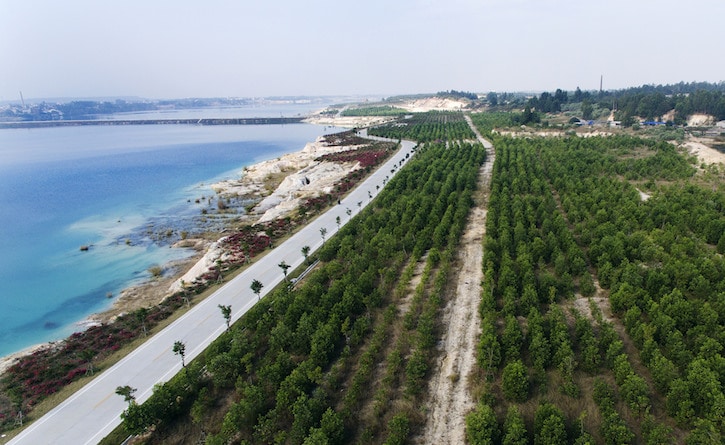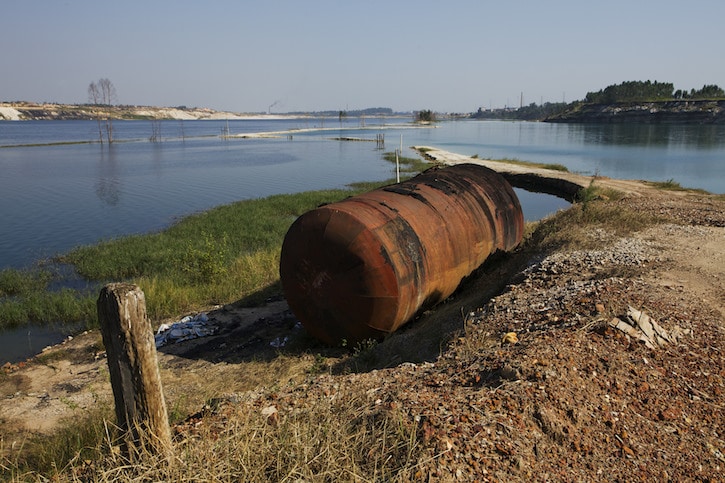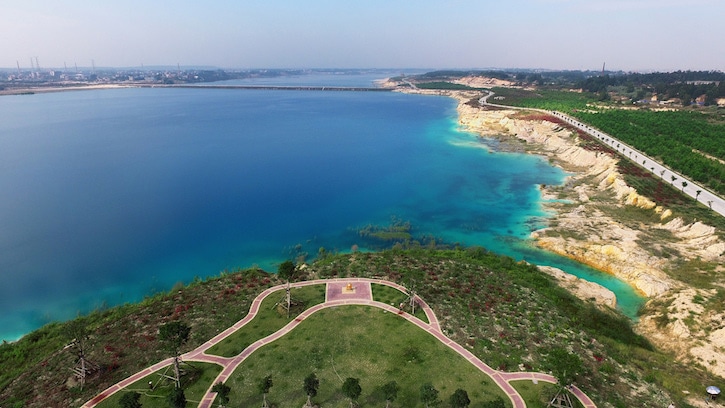
By Dorinda Elliott
Vice Mayor Liang Luoye points to the crystal blue lake and green saplings growing alongside and describes the controversy that was raging three years ago over the future of this newly developed Ecological Park. The area had been excavated since 1956 as an open pit mine, producing oil shale used in petroleum production, leaving behind small mountains of toxic grey slag.

Some members of the municipal government argued that continued exploitation of the mine would bring “big profits,” Liang says. Others, including Liang, who had just returned from a Mayors Training Program in the United States organized by the Paulson Institute, argued that it was time to stop polluting the land. “The sustainability point of view won the day,” says Liang.
The Paulson Institute Mayors Training Program is highly effective, because we learned about best practices in environmental management and systematic planning.
So the city of Maoming, the largest oil refinery base in Southern China, shut down the mine and created a recreation spot with an unlikely name: The Open Pit Mine Ecological Park. Work was undertaken to clean up the slag, and the place became a symbol of the city’s efforts to transition to a less polluting economic model, driven by sustainable agriculture and high tech production. Water from a local reservoir was diverted to fill the mine, creating a lake. Every year now, local Communist Party officials come and plant trees to educate local people about the importance of the environment.
“Mayor Liang saved this place,” says one of his deputies, though Liang stresses that his boss, the mayor, was a supporter of the park, too.
“It was like a nuclear wasteland,” Liang remembers. “Nobody would ever dare to come here, because it was so polluted.” Nowadays, people come to take photographs and stroll with their families. The government is building “chalets” along the lakeside with plans to develop tourism.

Liang says he was deeply impressed by his time in Chicago as part of a three-week Mayors Training Program, in which he studied cutting edge sustainability projects and urban planning. “The Paulson Institute Mayors Training Program is highly effective, because we learned about best practices in environmental management and systematic planning,” says Liang. He points out that Maoming’s mayor, Li Hongjin, has also visited the United States, “and so these ideas of ecological development and preservation of the river area have all been incorporated into Maoming’s plan.”
The most profound impact for Liang was seeing firsthand the transformation of Chicago, once a dirty industrial city, to a rejuvenated and thriving, clean center for innovation and services. “If we understand the history of the developed world—and we don’t know that history in China—if we know the process of how it all happened, then we can avoid the problems that the West incurred, or at least the bumps along the road might be smaller,” says Liang.
“We have been developing so fast in China,” Liang adds. “If we had some theory, some systematic training, we could have understood some of the development problems. We could have avoided some problems and come up with solutions.”

The city of Maoming, meanwhile, is moving toward a cleaner economic model. In the past few years, the government has shut down some 150 heavily polluting small-scale factories, and new advanced technology monitoring systems now track factory emissions of carbon and other toxins. “It’s all online, so there is nothing you can do to avoid detection nowadays,” says Liang. “You get discovered immediately.”
The city, which is the top agricultural producer in Guangdong province, has also developed “specialized cooperatives,” a coordinated agricultural system in which the government helps growers market and sell their products—lychees, longan, bananas, and other fruits and vegetables—all over China through e-commerce. A new high-tech zone has attracted 139 projects, and the government is trying to foster innovative tech companies through an incubation center that offers support to start-up companies. According to Liang, all waste is recycled and reused in the high-tech zone. “We are promoting a recycling economy,” says Liang, who says that energy consumption in Maoming’s buildings declined 34 percent in 2015.
The city is also cleaning up its rivers. “Local officials are now being held responsible for their environmental impact,” says Liang. According to locals, the smell of industry and petrochemicals used to be overpowering in the city, and the air pollution was thick. But today, Maoming’s skies are blue.
Looking ahead, how will the city continue to grow economically, if it is shutting down factories and moving toward a new economic model? “There is no longer an argument about the contradiction between economic development and environmental protection,” says Liang. “That battle has been won. We all know that we must protect the environment as we grow the economy. If it’s not green development, then we don’t want it.”



